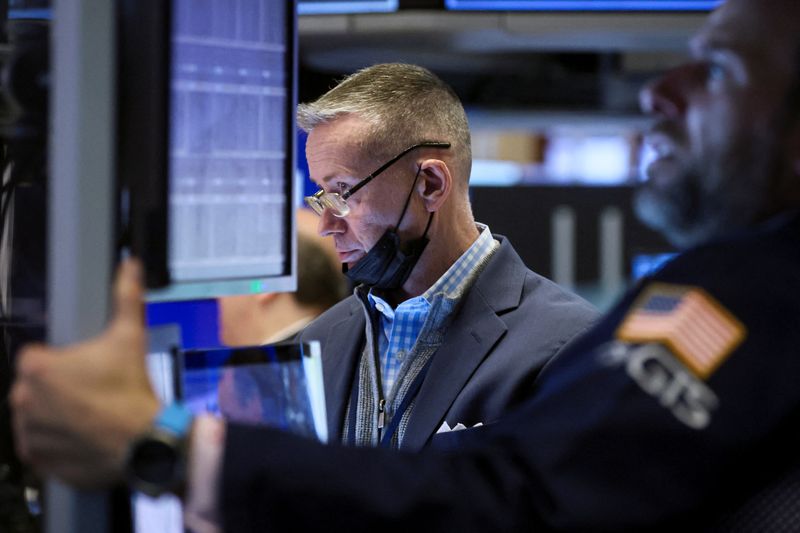By Lewis Krauskopf and Saqib Iqbal Ahmed
NEW YORK (Reuters) - Battered U.S. stocks are facing a potentially painful stretch in the weeks ahead, as hawkish Federal Reserve policy, rising bond yields, geopolitical uncertainty and the corporate earnings season fuel investor unease.
After last week’s sharp decline, the S&P is down 5.7% so far in April and is on track for its worst monthly drop since March 2020, when the spreading COVID-19 pandemic blasted stocks.
One measure of investor anxiety, the Cboe Volatility Index, known as Wall Street’s fear gauge, on Friday notched its largest one-day gain in about five months to close at a five-week high of 28.21.
“More variables in any equation create greater uncertainty in terms of the outcome,” said Michael Farr, president of Farr, Miller & Washington. “We have more variables now than I can remember in my career.”
Chief among market participants' worries is a Fed that has repeatedly ratcheted up its hawkish rhetoric as it gears up to fight the worst U.S. inflation in nearly 40 years.
The hawkish stance was underlined on Thursday, when Fed Chair Jerome Powell said a half-point interest rate increase "will be on the table" at the central bank’s monetary policy meeting next month.
Traders in eurodollar futures, which reflect the U.S. interest rate outlook for the next few years, on Friday priced in the Federal Reserve's rate-hike cycle peaking at a higher level than previously expected, adding to worries that the scope of Fed tightening could hit U.S. growth.
“The stock market is coming to grips with the reality that the Fed is serious about raising rates this time," said David Carter, managing director at Wealthspire Advisors. "It now expects large and quick increases and is having a difficult time digesting that.”
Rising Treasury yields have added to pressure on stocks and other risky assets. Real yields – which account for projected inflation – climbed into positive territory last week for the first time since March 2020, dulling the allure of equities in comparison to risk-free U.S. government bonds.
Plenty of investors believe the economy – and markets – can remain resilient. Solita Marcelli, chief investment officer, Americas, at UBS Global Wealth Management, said the U.S. economy is robust enough to grow even if Fed hikes match current expectations.
“We believe equity markets will continue to be range-bound until the market is convinced that a Fed-induced recession is not imminent,” she wrote in a Friday report.
Still, the ride may be a nerve-wracking one, especially as investors turn their focus to earnings season, which kicks into high gear this week with reports from megacap growth companies Apple (NASDAQ:AAPL), Microsoft (NASDAQ:MSFT), Amazon.com (NASDAQ:AMZN) and Google parent Alphabet (NASDAQ:GOOGL).
Though quarterly results have so far been largely on track, investors have been quick to punish companies reporting bad news. A recent casualty was Netflix (NASDAQ:NFLX), whose shares tumbled around 35% in a single session last week after the streaming giant reported its first drop in subscribers in a decade.
“Next week is the most important week of the first-quarter earnings season, and there is not a lot of confidence about results given what happened to a few big companies this week, Netflix being the most obvious example," said Peter Tuz, president of Chase Investment Counsel.
Mounting worries have bubbled up in options markets. The volatility futures curve - an expression of how traders see stock market gyrations panning out over future months - flattened on Friday, signaling that investors were growing more concerned about a near-term shock to stocks.
"The futures curve went from normally sloped to flat as a pancake within a few hours (Friday) afternoon, which shows a huge change in mindset in a short period of time,” said Steve Sosnick, chief strategist at Interactive Brokers (NASDAQ:IBKR).

Adding to the potentially volatile mix are developments overseas, including the war in Ukraine and Sunday's vote in France, where President Emmanuel Macron, a centrist, faces far-right challenger Marine Le Pen. The latest surveys showed Macron leading.
"Le Pen is a populist who’d be potentially anti-euro, and the fear is that it could be a shock along the magnitude of what Brexit was," said Thomas Hayes, chairman of Great Hill Capital LLC. "If Le Pen wins, the knock-on implication is that they might withdraw from the European Union or that would be a possibility that’s on the table."